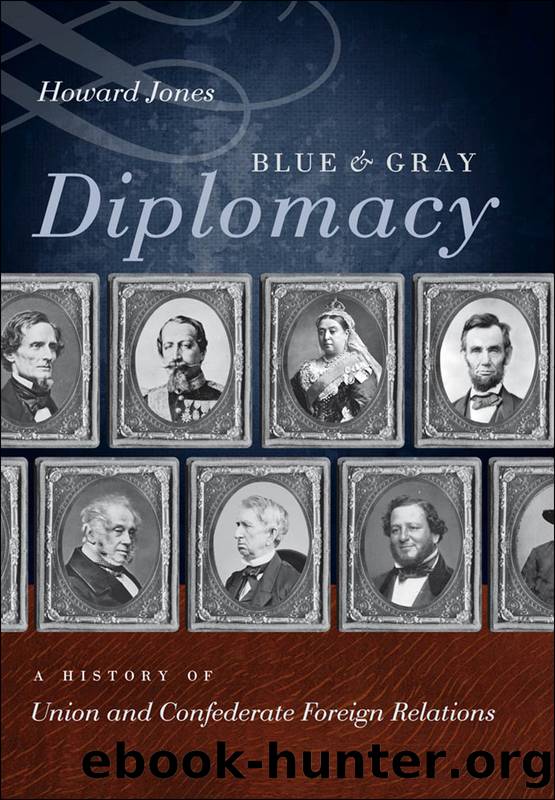Blue and Gray Diplomacy by Howard Jones

Author:Howard Jones
Language: eng
Format: epub
Publisher: The University of North Carolina Press
Published: 2010-07-14T16:00:00+00:00
President Abraham Lincoln and General George B. McClellan face each other at Antietam, Maryland, in September 1862. (Courtesy of the Library of Congress)
Slidell agreed with Shaftesbury, declaring that southerners could resolve the issue after a calm assessment of the economic and social values of the slave system. “If the day should ever arrive when slave labor ceased to be profitable and the slave could safely be liberated,” he insisted, “slavery would soon cease to exist.” What about the chances for gradual emancipation? asked Shaftesbury. If President Davis implemented such a policy, the European governments would grant recognition and take all steps necessary to end the war. Slidell responded that the slavery issue was for the states to decide and not the president. British recognition, Shaftesbury nonetheless felt certain, would take place in a few weeks. If so, Slidell declared, it seemed strange that London's ministers held back despite the French emperor's well-known interest in recognition. The Confederacy could only believe that Britain wanted to prolong the war in an effort to exhaust the Union. Shaftesbury denied that allegation and promised to do everything possible to convince his leaders to recognize the Confederacy.16
Shaftesbury assured Slidell that the battle of Antietam had not changed British interventionist sentiment. “There is every reason to believe that the event so strongly desired of which we talked when I had the pleasure of seeing you in Paris is very close at hand.” Shaftesbury did not speak on an official basis, of course, but he, once observed Charles Francis Adams, was a “good key” to understanding British policy.17
Regardless of which side won, the battle had not ended the talk of intervention. Lee's retreat into Virginia had shocked the British into realizing that his invasion of the North had not only failed to deliver a widely anticipated victory, but it had also restored the Union's morale so badly shaken at Second Bull Run. The Confederacy tried to minimize the impact of Antietam by boasting that McClellan had not destroyed Lee's forces, leaving them in a position to establish control over the vast region extending from the Atlantic to the Mississippi. Northerners had lost their senses, many British contemporaries seemed to believe. Lewis cynically remarked that the Union had come to realize what it meant to be governed by a “village attorney appointed Prime Minister for 4 years certain, during a period of civil war.” Hammond downgraded the importance of Lee's rebuff, asserting that his crossing the Potomac had been “more in the nature of a feeler” than a military offensive. Moran, however, saw through the self-serving charade, terming the outcome “a bitter draught and a stunning blow” to the British. “They express as much chagrin as if they themselves had been defeated.” Gladstone, too, welcomed the news, although for different reasons. “I am not sorry for the apparent ill success of the Confederates as invaders,” he wrote Argyll. “They might have become intoxicated, and entangled, by good Fortune.”18 In tactical terms, the outcome at Antietam proved indecisive; but for diplomatic purposes, the battle made clear that the Union would never accept mediation.
Download
This site does not store any files on its server. We only index and link to content provided by other sites. Please contact the content providers to delete copyright contents if any and email us, we'll remove relevant links or contents immediately.
| Arms Control | Diplomacy |
| Security | Trades & Tariffs |
| Treaties | African |
| Asian | Australian & Oceanian |
| Canadian | Caribbean & Latin American |
| European | Middle Eastern |
| Russian & Former Soviet Union |
The Secret History by Donna Tartt(16605)
The Social Justice Warrior Handbook by Lisa De Pasquale(11484)
Thirteen Reasons Why by Jay Asher(7777)
This Is How You Lose Her by Junot Diaz(5747)
Weapons of Math Destruction by Cathy O'Neil(5027)
Zero to One by Peter Thiel(4814)
The Myth of the Strong Leader by Archie Brown(4783)
Promise Me, Dad by Joe Biden(4439)
Stone's Rules by Roger Stone(4409)
Beartown by Fredrik Backman(4398)
How Democracies Die by Steven Levitsky & Daniel Ziblatt(4391)
The Fire Next Time by James Baldwin(4336)
100 Deadly Skills by Clint Emerson(4069)
A Higher Loyalty: Truth, Lies, and Leadership by James Comey(4024)
Rise and Kill First by Ronen Bergman(4006)
The David Icke Guide to the Global Conspiracy (and how to end it) by David Icke(3874)
The Farm by Tom Rob Smith(3867)
Secrecy World by Jake Bernstein(3772)
The Doomsday Machine by Daniel Ellsberg(3725)
